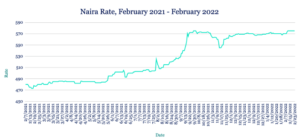
War in Ukraine weighs on African FX
Russia’s invasion of Ukraine has sent oil prices surging to their highest in eight years, putting increased pressure on oil-importing African economies such as Kenya, where the Shilling fell to an all-time low this week.
Meantime, African countries including Tanzania, Nigeria, Algeria and Mozambique could be in a position to boost exports of gas and oil to Europe and elsewhere given sustained disruption to supplies from Russia.
While Africa-Russia trade, amounting to $20bn of imports and exports last year, is likely to fall, the bigger impact for most Africans could be further increases in the price of food partly because Ukraine is one of the largest exporters of wheat, especially to the Middle East and North Africa.
Naira steady as port chaos balances rising oil
The Naira was unchanged against the dollar in the unofficial market this week, trading at 575. Protests over a new vehicle identification number valuation system have caused delays at Lagos’s ports, with further congestion expected as more new vehicles arrive.

Clearing agents say the new system has drastically increased import duties, making it challenging to clear vehicles from the ports, which could have knock-on economic impacts the longer the protests continue. The disruption is countering the effects of rising oil prices caused by the war in Ukraine. We expect the unofficial rate to remain at this level over the coming week.
Cedi under pressure amid dollar shortage
The Cedi lost further ground against the dollar, weakening to 6.619 from 6.560 at last Friday’s close—a 0.9% depreciation. This downward trend has been driven by increased demand for dollars that is outpacing supply.

Given that backdrop, the Bank of Ghana has instructed banks and brokers not to trade above the official rate. In a bid to tackle the Cedi’s depreciation, the government has been advised by some experts to evaluate and monitor the repatriation of income by foreign companies operating in Ghana, as well as put in place measures to regulate money being sent out of the country by wealthy Ghanaians to pay for overseas school fees, hospital bills and other services, according to a Ghana News Agency report this week. We expect the current pressure on the Cedi to continue in the near term.
Upbeat budget balances Rand outlook
The Rand strengthened against the dollar this week, trading at 15.03 from 15.12 at last Friday’s close.
Finance Minister Enoch Godongwana’s maiden budget speech this week outlined an extension of the Covid social relief fund by a further 12 months due to extra revenue from higher commodity prices.

Meantime, the government has lowered personal income tax brackets and rebates by 4.5% in an attempt to offset the impact of inflation pushing income earners into higher tax brackets. The budget speech also highlighted that income tax and VAT collections were higher than expected, while corporate revenue and profit has been resilient. The robust domestic backdrop should help protect the Rand against the impact of higher oil prices in coming days.
Egyptian Pound range-bound amid China vaccine talks
The Pound has continued to trade in a narrow range of 15.71 to 15.74 to the dollar over the past week. Egyptian and Chinese officials are scheduled to hold talks before the end of this month about potential exports of Sinovac Covid-19 vaccines to be produced in Egypt and sent to other African nations.

The country has already produced roughly 30 million doses of Sinovac and is currently in negotiations with AstraZeneca to manufacture its vaccine locally. Meantime, Egypt is planning to launch a new wheat import tender amid Russia’s invasion of Ukraine and the potential disruption to grain markets.
Egypt expects wheat imports to fall this year given its recent efforts to spur more local production. We expect the Pound to continue holding steady below 15.75 in the weeks ahead.
Kenyan Shilling hits fresh low on oil surge
The Shilling weakened to a fresh record low against the dollar, trading at 113.80/114.40 from 113.60/114.20 at last week’s close.
The latest round of pressure came as global oil prices rose to their highest level since 2014, pushing up import costs and leading to inflation.

Kenya’s FX reserves fell further, declining to $8.13bn from just under $8.2bn a week earlier, adequate for 4.97 months of import cover. The escalating conflict in Ukraine and anti-Russia sanctions are likely to lead to more pressure on the Shilling in the coming days.
Month-end inflows to support Ugandan Shilling
Uganda’s Shilling depreciated slightly this week, trading at 3510/3520 from 3500/3510 at last week’s close as importer demand for dollars outweighed inflows.

President Yoweri Museveni this week called on Europe to open its market to Africa’s food products to help improve farmers’ incomes, during a meeting with Norway’s state secretary for international development Bjorg Sandkjaer.
We expect the Shilling to stabilise at current levels with support from month-end dollar inflows.
Investment boosts Tanzanian Shilling outlook
The Shilling weakened marginally against the dollar this week, slipping to 2311/2321 from 2308/2318 at the end of last week. President Samia Suluhu Hassan said this week in an interview with The Africa Report that tensions in Ukraine are helping to generate European interest in Tanzania’s gas.
Meanwhile, the European Commission announced a grant of €425m for Tanzania to fund various development projects over the next three years, including digitisation, green cities and gender equality.

The government also signed two concessional loan agreements with the World Bank worth $650m for improving education and land administration systems. Those investment inflows, coupled with export proceeds from gold, manufactured goods and tourism, should support the Shilling in the near term.
Note to journalists: please feel free to quote from this briefing for news reports and let us know any requests for further comment or interviews via the contact details at the end, or by reply to this email. AZA is Africa’s largest non-bank currency broker by trading volume at over $1 billion annually. See https://www.azafinance.com
Issued by AZA. This Newsletter is produced as a service to our clients. It is prepared by our dealing professionals and is based on their understanding and interpretation of market events. AZA cannot be held responsible for any losses of whatever nature sustained as a result of action taken based on comments contained in this publication.
For more information, high-resolution charts or interviews, please contact:
Gavin Serkin
[email protected]
+44 20 3478 9710









